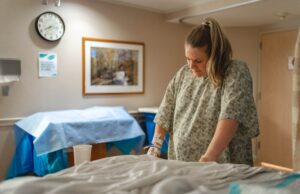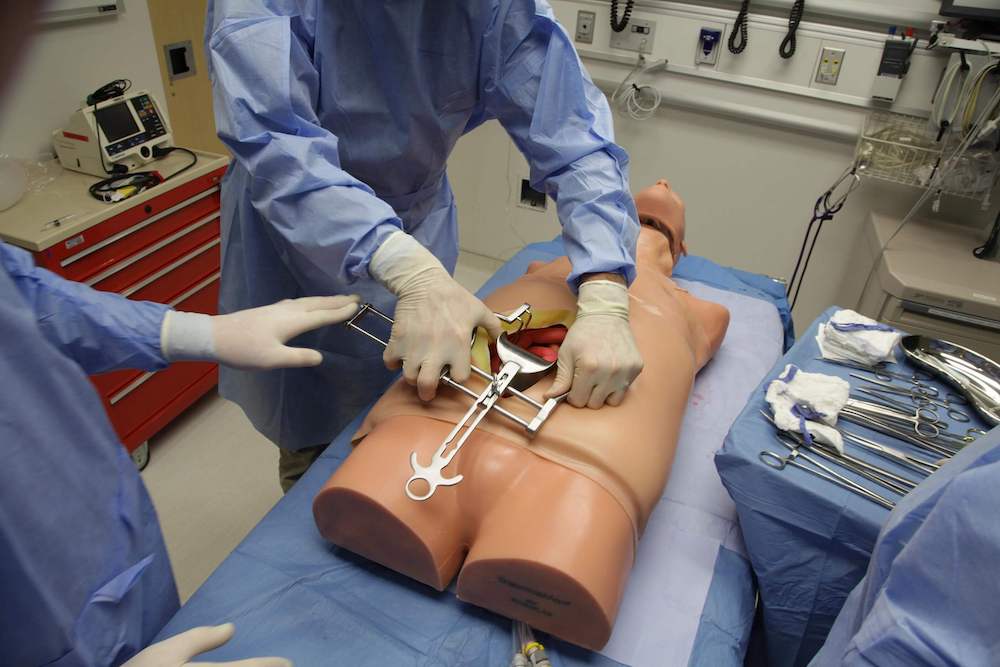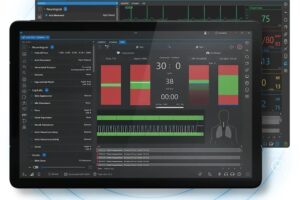Surgical Simulation
Surgical Simulation is a specialization of Medical Simulation in which healthcare trainees and professionals learn modern surgical interventions by utilizing surgery simulator technologies. Surgery Simulations can range from simple suture practice for a single learner to advanced robotic Surgery Simulations for an entire interprofessional surgical team. Healthcare professionals who focus on education and training through the use of Clinical Simulation methodologies and technologies should be aware of the various aspects of Surgical Simulation, including recent technological advancements, such as virtual reality.
The Case for Surgical Simulation
The surgical field has long been one of the leading medical specialties to incorporate Simulation, alongside the field of anesthesiology. This is due, in part, to the high costs inherent in training surgical learners, lack of access to surgical training materials like cadavers, and the stresses and risks of learning surgical techniques in an “on-the-job” fashion. Surgical learners need a high volume of exposure to surgical procedures to properly train and acquire the coordinated hand-eye movements needed when utilizing specialized surgical tools and manipulating biologic tissue.
Sponsored Content:
In response to these challenges in the surgical training process, surgery simulators from companies like VirtaMed, Surgical Science, Simulab and other vendors have been shown to reduce costs, lessen medical errors, and decrease lethal infection rates while improving provider performance. For example, a technique such as learning to place a central line is an essential skill for emergency medicine and internal medicine physicians to acquire—however; it can be difficult for students to get an adequate amount of exposure and practice to this skill while limiting the risk to themselves and their patients. Research has shown that adopting a specialized Surgical Simulator, known as a SimuLab CentraLineMan, can provide dramatic cost savings and better prepare students at the critical moment when acquiring the central line procedure skill is needed, reducing central line-associated bloodstream infections at an institutional level.
Types of Surgical Simulators Available
High-fidelity surgery simulators exist for the specialty fields of Laparoscopic surgery, neurosurgery, endoscopic surgery, trauma surgery, cardiac surgery, and interventional surgery, among others. These products can serve a dual purpose, helping educate new students and also helping working professionals perfect their mastery of specific skills and techniques. Surgical simulators can enhance the learning process via integrated learning curriculums, performance-based statistical reporting (such as tracking the number of movements a surgeon makes while completing a task), and screen recording for surgical debriefing and assessment purposes.
Because of their valuable real-time 3D rendered animation, haptic feedback devices, and ability to manipulate realistic hardware instrumentation, the surgical community has readily adopted high-fidelity surgical simulators. For example, The Fundamentals of Laparoscopic Surgery (FLS) certification by SAGES requires a skills demonstration through a timed performance of Surgical Simulation exams to qualify for a license. This demonstrates the confidence of educators and credentialing experts in the ability of Surgical Simulation to translate into actual skills proficiency.
Sponsored Content:
Specific Surgical Simulator Brands
Leading brands that provide robust Surgical Simulation training systems include Simulab, CAE Healthcare, VirtaMed, 3D Systems, Simbionix, now a part of Surgical Science, Symgery (formally known as OSSimTech), and Medical-X, among others. These surgical simulators can help surgical learners in a variety of capacities, including increasing their competence in the following surgical areas:
- Chest tube insertion
- Lumbar puncture
- Needle Decompression
- Tracheostomy
- Pericardiocentesis
- Diagnostic Peritoneal Lavage
- IV Cutdown
- Laparoscopy
- Endoscopy
- Ultrasound-guided procedures
- Arthroscopy
- Urologic procedures such as TURP or TURB
- Bronchoscopy
- Spine surgery
A surgical simulator can also help providers develop their surgical skills to better respond to high-acuity, low-frequency events. Situations that demand a surgical skill such as a cricothyroidotomy are infrequently encountered in clinical practice; however, they are high-risk. It is essential for surgical specialists to be familiar with performing these surgical skills in the event of an emergency, and Surgical Simulation can help increase their exposure and competence, and provide an opportunity for periodic refreshing and reviewing of these skills.
Click Here to Connect to Leading Surgical Simulation Vendors
Beyond invasive surgical techniques, basic surgical trainers for practicing skills like suturing and knot tying are also available from Limbs & Things, Remedy Simulation, Inovus Medical, and many other vendors. These can help learners of all levels of training increase their competence and confidence.
The Impact of Surgical Simulation
Surgical Simulation can increase students’ exposure to surgical scenarios, and it can also help with another challenging aspect of surgical training, which is standardization. When students can train using the same Surgical Simulation methods, their performances and outcomes can be more easily assessed and compared, making the evaluation process more fair and equitable. Instead of students having variable materials from which to practice and learn, such as parts from several different cadavers, Surgical Simulation affords them access to the same materials, and also allows them to revisit their skills later within the same practice environment.
HealthySimulation.com is dedicated to providing the latest Surgery Simulator news and #MedSim resources from around the world. To follow along, sign up for our free medical simulation email newsletter, follow @HealthySim on Twitter and @HealthySim on Facebook, or join our HealthySim LinkedIn Group!
Surgical Simulation can also benefit learners during times of global uncertainty, such as the recent COVID-19 pandemic. During the pandemic, the number of students allowed into operating rooms for observation or learning purposes was severely limited, if not entirely suspended. Practicing skills on live patients, for those surgical learners who did have access, also posed the risk of viral exposure. However, a simulated surgical environment confers none of these risks. Instead, it allows for a controlled, safe setting in which learners can acquire the skills necessary to advance in their training while reducing the risk to themselves and their patients. This means that the acquisition of surgical knowledge does not need to be put on hold, and the crucial training of surgical students can continue uninterrupted, regardless of external dynamics.
The Role of Virtual Reality in Surgical Simulation
Due to recent advances in Virtual Reality in Medicine, virtual surgery training is a quickly expanding sector within the broader field of Healthcare Simulation. One critique of virtual reality in Surgical Simulation is that the manipulation of surgical instruments in virtual reality is not as realistic as the manipulation of these tools in real life. While this may be true now, it may not always be the case. Additionally, the cost-effectiveness of VR headsets and the ability of Healthcare Simulation educators to create an infinite number of new scenarios guarantees that Virtual Surgery training is here to stay. Vendors who provide VR surgery training programs include FundamentalVR, Osso VR, PrecisionOS, among others.
How to Learn More About Surgical Simulation
Surgical Simulation is in high demand for healthcare providers who need to increase their skill levels in various surgical procedures that are often difficult to practice in real-time, with an actual patient. To meet the needs of their students, educators who focus on Simulation should investigate the Surgical Simulation tools that are most appropriate for their learner populations, whether they are medical schools, allied health schools, dental schools, or otherwise. Healthcare Simulation educators looking to incorporate more surgical offerings into their Surgical Simulation index can use the “Find Simulation Vendor” form to connect directly with leading vendors.
Surgery Simulation Latest Articles

6 Additional Medical Simulation Keywords You Need to Know About

The Observational Structured Assessment of Debriefing Tool

Use of XR in Spinal Surgery and Incorporation of Surgical Theater Tool

Research Update: Clinical Simulation in Nursing | December 2022

Estrategias Innovadoras En Simulación Clínica Gineco Obstétrica

A Quick Guide to Birthing Simulators & OBGYN Simulation

Saudi Health Simulation Conference Celebrates 5th Year with Entire Week of Events

Latest Clinical Simulation News From Around the World | October 2022

Latest Clinical Simulation News From Around the World | August 2022

Latest Clinical Simulation News From Around the World | July 2022

6 Medical Simulation Keywords You Need to Know About
Sponsored Content:

















